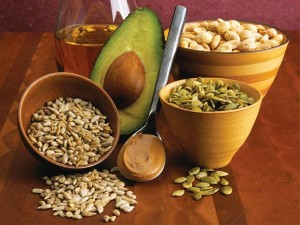Do you remember when SnackWells arrived and the low-fat craze started?
Ah, 1992…the beginning of the onslaught of low-fat and non-fat “food” products. Back then, I believed that I could eat as much low-fat or non-fat “food” as I wanted without having to worry about calories. As a person who has always loved sweets and baked things, it was a dream come true! I remember arguing about it with my mother, who insisted that calories still did matter – and warned me that eating a box of fat-free cookies every day was probably going to make me fat.
She was right, as usual.
The low-fat/no-fat craze is partially responsible for our current weight problem (and a myriad of other health problems) here in America.
Why?
Well, so-called experts started telling us that calories didn’t matter – as long as we ate low-fat or non-fat food, we’d be fine. Calories DO matter, and so does where we get them from.
And – dietary fat improves the taste and texture of food. Take it out, and what is left? Dry cardboard-tasting “cookies”.
So, food manufacturers added sugar – and lots of it – to products to make them taste appealing. The products ended up having around the same amount of calories – but more were coming from sugar and less from dietary fat.
And we got fatter and fatter, and developed more diabetes, and more heart disease.
Eat as many low-fat and no-fat foods as you want, they said. Calories don’t matter – fat grams do, they said. Fat makes you fat, they said.
But, here’s the thing…fat isn’t the demon that it was made out to be.
We NEED fat in our diet. Here’s why:
1) Absorption of vitamins A, D, E, and K: These vitamins are fat-soluble, which means that the body needs dietary fat to absorb them.
2) Omega-3s and omega-6s play roles in mood and behavior. They are the precursor to many hormones and chemicals produced in the brain.
3) Brain health. Your brain uses fat to make cell membranes and the protective myelin sheath that insulates your neurons.
4) Trans fats are pretty bad for your cardiovascular system, but monounsaturated fats and omega-3 fats prevent heart attack and stroke. Good sources of monounsaturated fats are avocados, olives, almonds, peanuts, macadamia nuts, pecans, hazelnuts, peanut butter, and olive and sesame oils.
5) Not all saturated fats are bad for you. One beneficial (and super yummy) saturated fat is coconut oil, which has scientifically demonstrated health benefits, including healthy support for your heart and brain, skin, immune system, and thyroid. Coconut oil has some very special properties.
6) Fat is filling and provides pleasant texture to food. Remember when I mentioned low-fat and no-fat cookies that taste like cardboard? Take the fat out, and that’s what you get. Have you ever noticed that when you eat a high-carb, low-fat meal, you are hungry an hour later? It is hard to overeat on a moderate fat, high-protein, low-carb diet.
And, this is certainly interesting:
Scientific analysis of 21 earlier studies showed “no significant evidence” that saturated fat in the diet is associated with an increased risk of coronary heart disease. The 21 studies analyzed included nearly 348,000 participants, most of whom were healthy when they were enrolled. They were followed for five to 23 years, during which 11,000 developed heart disease or had a stroke. Looking back at the dietary information collected from these thousands of participants, the investigators found no difference in the risk of coronary heart disease, stroke, or coronary vascular disease between those individuals with the lowest and highest intakes of saturated fat. This goes completely against the conventional medical wisdom of the past 40 years. It now appears that many studies used to support the low-fat recommendation had serious flaws. (source)
So, don’t toss out those egg yolks, don’t fear butter, try some coconut oil, and eat some nuts and seeds! Your body will thank you.

